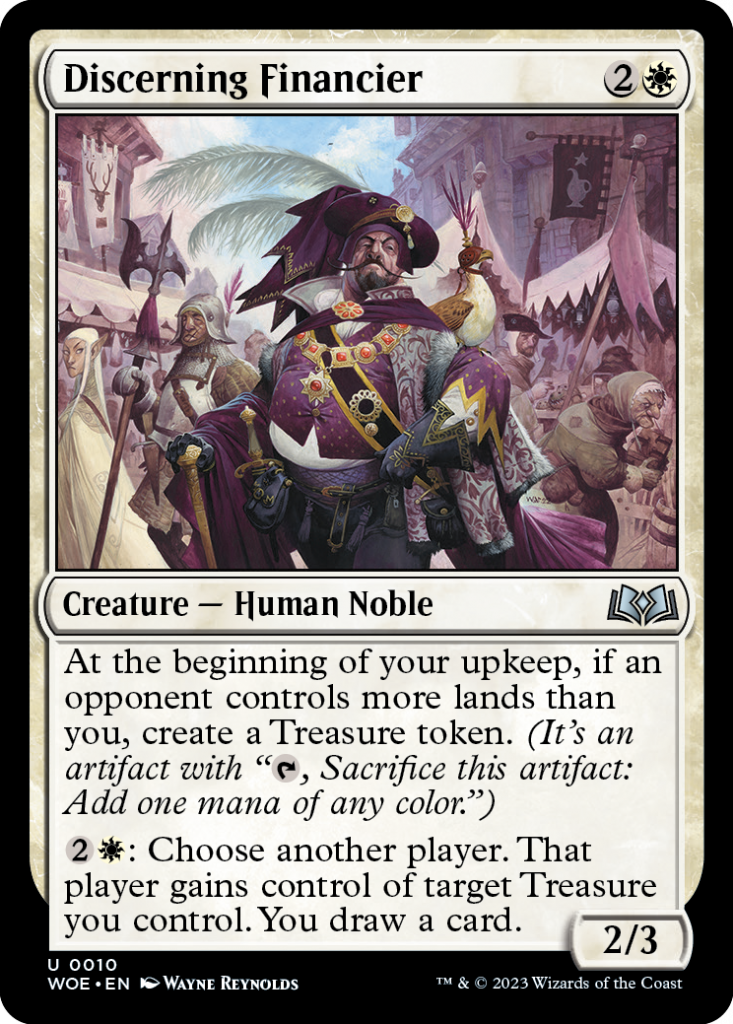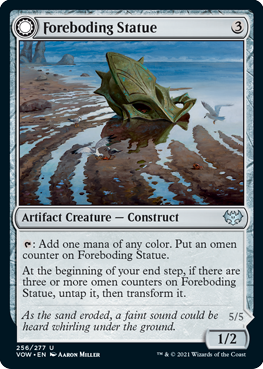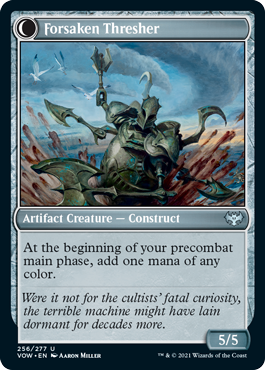Thanks to our friends from Wizards of the Coast for this great preview card! Note how the targeting works so that you actually have to give the Treasure to the other player in order to draw the card.

Thanks to our friends from Wizards of the Coast for this great preview card! Note how the targeting works so that you actually have to give the Treasure to the other player in order to draw the card.

Hey everyone. You might normally be expecting a quarterly update today (the Monday before the pre-release), but given the proximity of Phyrexia: All Will Be One and the upcoming Aftermath, we figured we’d cool jets until 8 May, the Monday before the release. We’ll have a full quarterly update then. Enjoy yourselves at the Pre-Release. These cards are going to be wild! May all your battles be glorious (and battered down).
Like other DFCs, the color identity of a Battle considers both sides of the card. For example, the CI of Invasion of Theros is white/blue. Also, please remember that for a DFC to qualify as a commander, its front face must be a legendary creature (or have text on its front face otherwise identifying it as a legal commander). There are currently no plans to change this rule. Enjoy the remainder of the #MTGMOM preview season. If you’d like to chat about all the saucy new cards, pop on over to the RC Discord server and join a bunch of friends already doing so!
We understand that the new toxic ability from Phyrexia: All Will Be One has folks asking about raising the number of poison counters in Commander. We’ll keep an eye on how it goes, but don’t see a need to take action before we’ve experienced the cards out in the wild. Back when he was a member of the Commander Advisory Group, Jim did a great video on the topic, which pretty much still encapsulates how we feel.
As always, if you’d like to discuss this (or any other topic), head over to the RC Discord, where there are specific channels to do just that.
By Savannah Beard
The Commander format produces myriad experiences within multiplayer Magic. The Rules Committee and Commander community-at-large stress the importance of open-mindedness and communication, regarding gameplay preferences, and the kinds of experiences its players wish to have. This directs worthwhile attention to “the Gathering” aspect of our pastime, and harbors shared appreciation of the game itself. Meanwhile, the optimization of a player’s or group’s Commander decks, strategies, and political maneuverings to win games, is considered fun by some, and problematic by others.
The Philosophy of Commander admits “it does not seek to regulate competitive play,” and encourages “groups to use the rules and the ban list as a baseline to optimize their own experience.” Commander’s underlying malleability gives cause for Conquest, a community-driven variant of Commander, aimed at addressing common barriers to accessibility and balance, particularly in the context of optimized Commander.
The Conquest variant adapts Commander’s ten rules, with four changes:
Conquest also uses a substantial banlist to regulate the high-power metagame.
Conquest is rooted in a culture of competitive Commander, that celebrates both the wonders of high-power Magic and the social experience of the multiplayer format. This article explores how Conquest promotes harmony in this context, and invites the reader to apply the lessons of Conquest to your own understanding of Commander.
Accessibility
What do we mean by “accessibility,” or making Commander more “accessible?” One answer is affordability: the expense of a highly tuned deck is prohibitive to many, especially because of the scarcity of Reserved List cards. To provide a more affordable experience, Conquest excludes all cards on the Reserved List as a first principle. We recognize that history, collectibility, and nostalgia are driving factors in Commander playership. While unfortunate to leave behind some of Magic’s most interesting and powerful designs, a path for everyone to acquire excellent Conquest decks must begin with this difficult step.
Accessibility means more than just affordability. The size of Conquest decks, which can be as few as 80 cards, is another major accessibility feature. Smaller decks are easier to learn and master for beginning players, easier to construct and test for brewers, and easier to handle, search, and shuffle for everyone. Improved decklist legibility lightens mental load. 80 cards being only a suggested minimum adds flexibility to making cuts, and permits constructing a deck that fits both Commander’s and Conquest’s parameters.
The Onslaught/Zendikar fetchlands, like Polluted Delta, are uniquely disruptive to game flow in any format where they are present, especially Commander. Their activated ability requires searching a large library, tracking a life payment, and shuffling. Sequencing their deployment in multiples creates a tedious attention and time sink that other lands do not. The power of fetchlands in fixing mana and enabling other synergies is missed by some in Conquest, where these cards are banned, but the consensus is that the experience without them feels much more streamlined.
Bettering accessibility in our games is vital to sustainable community building. We need to recognize and eliminate barriers to access in the hobby, especially in terms of gender, social class, and disability, because we should foster inclusion and belonging, and reward improvement and success, without elitism and gatekeeping. Community has transformational power, but before we can wield it, we must first involve our authentic selves. All gamers in our pastime can take this to heart–Conquest engrains this mentality from Commander even deeper into its rule set.
Balance
The curation of competitive play in Conquest is its main philosophical departure from Commander. The Rules Committee conservatively maintains Commander focusing primarily on the casual experience; Conquest’s rules and ban list, on the other hand, invite open exploration of Conquest’s fringes and upper boundaries. While competitive balance is a nebulous topic in gaming, expertise in powering and piloting optimized Commander decks has especially crystalized in the past few years.
In the competitive Commander context, a core of fast artifact mana and powerful tutors homogenizes deck building and makes luck in mulliganing a strong factor in success. Card combinations that win with few resources and no prerequisite board state detract from Commander’s stability as a strategy game. The dominance of combo, prominence of disruptive anti-combo decks (which often win with their own combos), and Commander’s starting life and commander damage constraints, threaten the variety of viable archetypes.
So how does Conquest create strategic and archetypal balance? Players start Conquest games with 30 life, and 12 combat damage from one commander eliminates a player. These tweaks from Commander alleviate the strains on strategies that attack life totals directly, and particularly invigorate commander-damage-dealing archetypes. These gameplans are atypical in optimized Commander pods, but are commonplace in Conquest.
With its ban list, Conquest prohibits some centralizing fast mana, tutors, combo enablers, and card advantage engines, but none of these kinds of cards are totally eliminated. For instance, instead of Mana Crypt, Sol Ring, and Jeweled Lotus, Conquest players work with Chrome Mox, Mana Vault, and Lotus Petal. A banned-as-commander section allows proven legendary cards like Tymna, the Weaver and Oko, Thief of Crowns to remain playable inclusions without being clear best choices in commanders.
And oh, Planeswalker commanders! Conquest implements an idea demonstrated in Brawl and Oathbreaker, that most planeswalker commanders add new dimensions to deck personalization and metagame dynamics. Advances in planeswalker design technology have yielded compelling new characters and mechanics, as well as efficient non-combat answers to planeswalkers. The renewed emphasis in Conquest on creature combat, due to the life and commander damage changes, pressures planeswalker permanents to keep them in check.
Conquest accentuates the process of optimizing constructed Magic, but encourages players to progress at their own pace. An average Conquest deck can still have a good game against a top-performing deck, because Conquest, in some ways, narrows the power level spectrum. For those who take pride in optimizing strategies that push the envelope, Conquest welcomes that attitude too. Taken to its extremes, the Conquest metagame can show which play patterns might be too successful: if you think Conquest can be broken, you should try and prove it!
By incorporating balance and competitive play into its identity, Conquest destigmatizes optimization and the mindset of playing to win. Studio X’s significant design attention on Commander Magic, and some of its most power-pushed products like Jeweled Lotus, may necessitate amending Conquest’s ban list, but we are optimistic that the future holds more designs in line with Command Tower.
Conquest, in my Commander?
It’s more likely than you think.
Much like Elder Dragon Highlander was first brought to light by remote Magic judges cleansing their palette from the monotony of tournament Magic, Conquest originated in online competitive EDH cabals, where repetitive play patterns, especially involving the card Flash, also warranted discussion of change. Conquest serves a broad audience: since being unleashed on the public, Conquest has garnered playtime not just from former and current competitive Commander players, but self-described “casuals” and non-Commander Magic enthusiasts as well. Adoption of Conquest has transcended literal borders and language barriers, too.
At a technical level, Conquest and Commander are separate formats, and this is advantageous to both leadership groups. Conquest is guided by a different yet related set of principles from Commander-as-written, justifying bans that support the health of the high-power metagame. Format supervision in our online era can transparently incorporate community feedback, and Conquest’s management works to meet this standard regularly. By distinguishing itself, Conquest makes breathing room for Commander.
Philosophically, the similarities and compatibilities between Conquest and Commander are robust. Conquest retains Commander’s foundational principles: singleton constructed decks, legends to lead them, and a welcoming, multiplayer atmosphere. A relaxed, “beer and pretzels” social environment is not mutually exclusive to tight decision-making and powerful Magic. Thus, the experiences Conquest precipitates align with Commander Magic, or the greater vision of what Commander can be, because Commander licenses groups to suit our own passions by modifying its overarching framework.
Further practical evidence for the compatibility of Commander and Conquest is found in the abundance of resources that support enjoyment in both formats. Most game knowledge, card collections, piloting expertise, and interpersonal relationships, are just as applicable in Conquest as they are in Commander. In fact, virtually any preconstructed Commander product can be modified to Conquest simply by cutting Sol Ring! The threshold to Conquest entry is very low. At the other end of the spectrum, Conquest can reward advanced skills like primer writing, metagame analysis, event management, and high-production content creation. (The deck building website Moxfield has Conquest format integration.)
However, Conquest is not immune to the core critique of “competitive multiplayer” as a concept: competitive logic in multiplayer has contentious, gnarled consequences. We believe Conquest can be instrumental in establishing new norms for competitive and tournament multiplayer settings. The Conquest community, as all gaming communities should, strives to root out antisocial and unsporting behavior, such as collusion, kingmaking, spite play, and quarterbacking. We know fair play, shared learning, and mutual respect to be integral to the Conquest and greater Magic ethos.
A Harmonious Future for Multiplayer Magic
Conquest does not intend to polarize nor splinter the groups that already love Commander. Commander players are independently discovering intuitions about modifying the format to the interests of our own groups, and the shared language, for when players with different preferences intermingle, is continually evolving. Conquest stands, on its own merits, in dialogue with Commander Magic: it is a peace offering, renewing Commander’s social contract with optimized play in mind.
When viewed from the basis of Commander, Conquest might inspire players of all persuasions to further assess our own metagames.
Commander’s overwhelming popularity has matured the appetite for the kinds of Magic events that its community attends. Some local game stores award booster and promo packs for winning pick-up Commander games, and an international subculture of tournament Commander is germinating in the competitive online space. In these contexts, the uncompromising pursuit of victory can drown out the prosocial pretense of the Gathering. Because Commander-as-written remains fundamentally “not competitive,” Conquest manifests an alternative accessible and balanced environment for these settings.
Thank you for engaging with this essay. I hope this has at least given you new fodder for pregame and aftercare conversations in your Commander circles, and maybe it enticed you to try Conquest on its own terms. Conquest has enriched my appreciation for the Philosophy of Commander and my passion for Magic as a whole ecosystem of recreation. For the Conquest community, our format is not merely a reconstruction of Commander with the architecture of competitive Magic, but a bridge to more sublime, resonant experiences that the pastime engenders.
Cat lover and Brawl apologist Savannah “beard_umbra” Beard is a Level 1 Judge, moderates the PlayEDH Discord, and after composing this article, was appointed to Conquest’s Balance Team. Follow Savannah on Moxfield.
Welcome back to the feature that we’re rebooting on the RC website, a brief Monday morning check-in from one of our members.
Today it’s two simple reminders. First, our next Quarterly Update, always scheduled the Monday before the Pre-Release, will be on 7 February. We look forward to the Kamigawa: Neon Destiny previews starting in earnest next week.
Second, for those of you who are budding Commander content creators, there’s space for you to share the links for your work on the Commander RC Discord server, in the channel self-promotion. We know that breaking into the content creation game can be difficult. Here’s our way of providing a bit of help, getting new folks’ content in front of more eyes.
We’re always active over on the Discord server, so if there’s any topic you want to chat about, just drop on by!
We’ve just hit 5,000 subscribers to the RC Discord, so we want to say thanks to everyone who has joined us and taken part in the many good faith discussions we’ve had in the various channels.
We promised that the 5,000th subscriber would get the choice of two signed Sheldon Menery tokens (one from SCG, one from Inklin Customs) or the ritual burning of said tokens. The winner, @Tokee, a rabid Krark fan, asked instead if we could ritually burn two Krark cards. We’ll be making that happen in an upcoming tweet.
Here’s to the sky being the limit for the RC Discord server. We’ll see you over there soon. Next stop, 10,000!
Here’s the sweet preview that our friends from Wizards of the Coast sent us:


The cards from Secret Lair: Stranger Things will be legal in Commander. Like with any cards, they’ll be judged on their individual merits. If any of them demonstrate that they’re unhealthy for the format, we’ll take appropriate action.
To clarify, Friends Forever is a limited-scope, partner-like ability. Any two creatures with Friends Forever can be your commanders. They do not interact with creatures that have the normal partner ability (Rule 702.124a).
Although we’re not the biggest fans of mechanically-unique, limited-availability cards, the folks at Wizards of the Coast have improved their processes, making the Secret Lair drops more available to more people for longer–especially since the cards will be getting Magic IP equivalents starting in Streets of New Capenna. We strongly encourage them to continue this trend.
If you’d like to talk about any of this further, we’re happy to invite you to the RC Discord server’s #format-philosophy channel for good faith discussions.